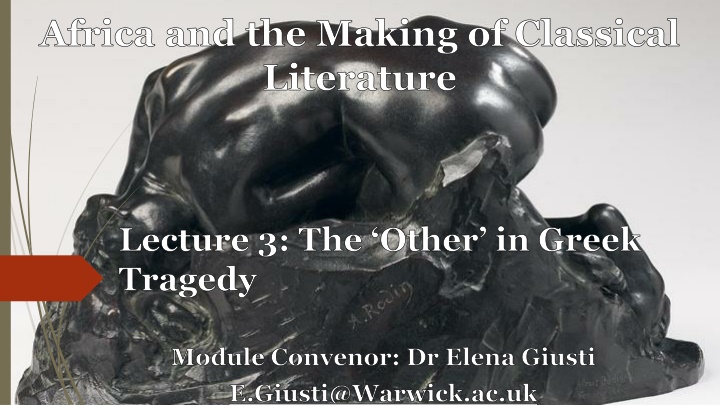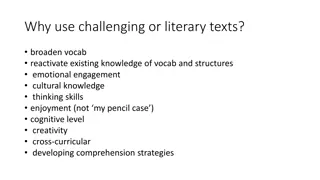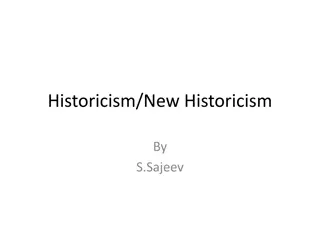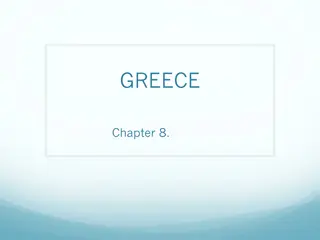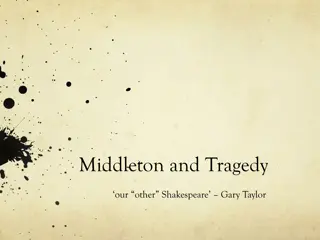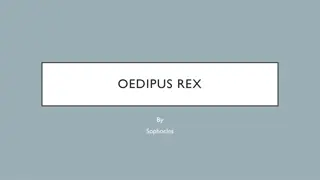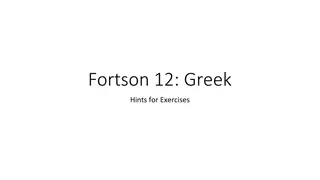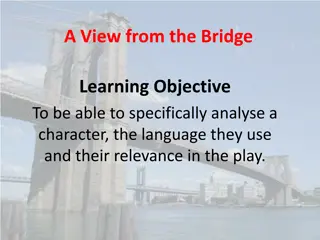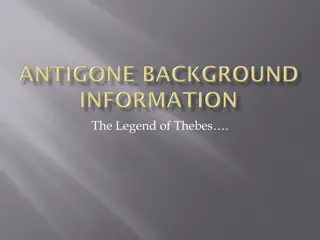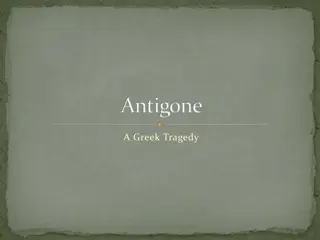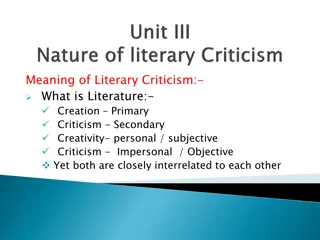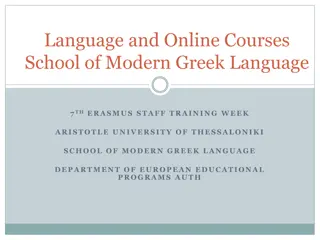Exploring the Role of the Other in Greek Tragedy through Literary Texts
This discussion delves into the representation of the 'Other' in Greek Tragedy, focusing on how language, rhetoric, and symbolism shape reality in classical literature. Through works like "Helen" and "Suppliant Women," the exploration of truth versus appearance, the significance of names and actions, and the portrayal of Egypt as a symbol of tension between reality and illusion are highlighted. The evaluation extends to the ethical and epistemological dimensions, emphasizing the interplay between criticism of life and art in storytelling. The enduring association between the Orient and sexuality in Western perspectives towards the East is also touched upon.
Download Presentation

Please find below an Image/Link to download the presentation.
The content on the website is provided AS IS for your information and personal use only. It may not be sold, licensed, or shared on other websites without obtaining consent from the author.If you encounter any issues during the download, it is possible that the publisher has removed the file from their server.
You are allowed to download the files provided on this website for personal or commercial use, subject to the condition that they are used lawfully. All files are the property of their respective owners.
The content on the website is provided AS IS for your information and personal use only. It may not be sold, licensed, or shared on other websites without obtaining consent from the author.
E N D
Presentation Transcript
Africa and the Making of Classical Literature Lecture 3: The Other in Greek Tragedy Module Convenor: Dr Elena Giusti E.Giusti@Warwick.ac.uk
Represented in 412 BCE In obvious dialogue with Gorgias Helen, and with the sophists reflections on how language and rhetoric shapes reality The play is interested in the paradoxical interactions between reality and appearance (doxa, eidolon) and especially in the ways in which language shapes reality, as proven by the insistence upon Helen s name (onoma) in comparison to her actions (erga) Helen 42-3 , / It wasn t me, it was just my name
The play thus actively invites us to question how literary texts contribute to construct their own realities and their own historical contexts, in obvious connections with mechanisms of power (cf. Said s Imagined Geographies ) See C. Segal 1960:561: the Helen s antitheses between truth and appearance embrace the ethical side of the questions about the nature of reality as well as the epistemological questions about the role of language, myth, and art in communicating that reality. One cannot fully separate the meaning of the play as a criticism of life from its meaning as a criticism of art.
From the very start of the play, the Helen both exploits and at the same time creates Egypt as a symbol for exploring tensions between reality and appearance , . These are the flows the Nile, rich with beautiful nymphs, the river that, in place of the divine rain, moistens the plain and lands of Egypt by the melting of white snow. Proteus, while he lived, was king of this land (Euripides, Helen, 1-4)
Aeschylus, Suppliant Women 556-564 , , , , - - , . And she arrived, while the winged cowherd was still piercing her with its sting, in the plain of Zeus, rich in all kinds of pasture, the snow-fed meads over which flows the might of Typhos and the water of the Nile, untouched by the plagues, maddened by undeserved sufferings and agonies inflicted by the hurtful sting, a maenad of Hera.
Said, 1978:188 on the fecundity of the East Woven through all of Flaubert's Oriental experiences, exciting or disappointing, is an almost uniform association between the Orient and sex. In making this association Flaubert was neither the first nor the most exaggerated instance of a remarkably persistent motif in Western attitudes to the Orient . . . Why the Orient seems still to suggest not only fecundity but sexual promise (and threat), untiring sensuality, unlimited desire, deep generative energies, is something on which one could speculate... Nevertheless one must acknowledge its importance as something eliciting complex responses, sometimes even a frightening self- discovery, in the Orientalists, and Flaubert was an interesting case in point.
Double Colonisation Postcolonial Feminist Theory Studies the effects of Colonialism/Imperialism + Patriarchy/Male Dominance For women, the problem centered on the fact that the conditions against which they were campaigning were the product of two kinds of oppression which put the antagonists of the nationalist struggle in the same camp: patriarchal systems of exploitation were common to both colonial regimes and indigenous societies. Women therefore had to fight the double colonization of patriarchal domination in its local as well as its imperial forms. (R. Young Postcolonialism, 2001: 379)
The Other in the Helen Both in the Helen and more obviously in the Suppliant Women, Egypt functions not only as a space of fertility, fecundity, fertile for the Western colonial imagination, but as a other space that provides a suitable setting for women to speak out about feminine experience and male dominance; In a number of ways, the stage of Euripides Helen is a site of displacement (mythical, remote, fictional) where Athenians can put into performance the experience of being other to themselves: barbarians and female, but also surprisingly un-heroic (as in Menelaus characterisation); The theme of the double, rehearsed constantly throughout the play, opens up a number of possible split identities both for the plays characters and for the spectators themselves, allowing them to interrogate the nature of their own selves as well as that of others , and of the reality that surrounds them.
Does the play enact a fantasy of splitting from rape for Helen? (Vasunia 2001: 61-2) Helen 31-6 But Hera, annoyed that she did not defeat the other goddesses, made Alexandros union with me as vain as the wind: she gave to king Priam s son not me but a breathing image she fashioned from the heavens to resemble me. He imagines vain imagination that he has me, though he does not. , , , , .
and to what extent is Helen reliving her own trauma with Paris behind the threats of Theoclymenus? Helen 66-7 , , . even if my name is reviled in Greece, my body shall not here be put to shame. Helen 296-7 But when a woman is married to a man she dislikes, even her own body becomes distasteful to her. , .
And what about the Egyptian characters? Is Egypt (Proteus offspring) also split into the pair of Theonoe and Theoclymenus? Helen 66-7 , [ ] , , , , . In this house she bore two children, a boy named Theoclymenus [because he honored the gods throughout his life] and a fine maiden called Eido.* When she was a babe she was her mother s glory, but when she came to womanhood and was old enough to marry they called her Theonoe: for she knew all that divination can tell, both present and future, receiving this office from her ancestor Nereus. *Eido = Eidothea, who knows divine things
Theoclymenus is marked by his desire for sexual aggression, and referred to as a barbarian, just as previously Paris Cf. Helen 224-5 throughout the cities of Greece runs the tale that puts you in the bed of a barbarian, my lady with Helen 293-6 What fate is left for me? Choose marriage as an escape from trouble and live with a barbarian husband, sitting at his rich table? Helen 62-5 the late king s son is huntingto marry me ( ). Hence honoring the husband I once had I have flung myself as a suppliant upon this tomb of Proteus so that it may keep me inviolate for him. Helen 544-5 He s a savage ( ), by the look of him, the man who hunts ( ) me! Helen 276 in barbarian lands all except one man are slaves.
Theonoe, on the other hand, is marked by her devotion to the gods, her wisdom, and her desire to remain chaste Helen 998-1003 As for me, both my nature and my will tend toward piety ( ). I love my own self ( ) and will not stain the good reputation of my father. I shall not do a kindness to my brother that will bring me a bad name. I have in my nature a great temple to Justice. She is, in a sense, Ariel to Theoclymenus Caliban (Segal), with the pair showing two different views of Egypt, both the decadent kingdom and the repository of the ancient mystical wisdom of the East.
Theonoe, on the other hand, is marked by her devotion to the gods, her wisdom, and her desire to remain chaste But she is also many ways another double for Helen (see Helen 830 [Menelaus] This is your task: nothing like a woman to deal with a woman. ) in a world that reverses the society of the polis upside down by giving the prerogative of action to women: Helen 1049 Listen and see whether a woman too might say something clever/wise ( ) Cf. also the mini battle of Troy at the end of the play, Helen 1602-4 Helen from the stern urged them on: Where is the glory you won at Troy? Show these barbarians!
The Other in Greek Tragedy Edith Hall 1989 Inventing the Barbarian: Greek Self- Definition through Tragedy, Oxford Froma Zeitlin 1996 Playing the Other, Chicago
Hall 1989: the image of an enemy extraneous to Hellas helped to foster a sense of community between the allied states. The Athenian empire was itself based on a democratic constitution, it encouraged and sometimes violently imposed democratic systems on its allies or dependencies. The most important distinction Athenian writers draw between themselves and barbarians is therefore political. The subtle comparison of Greek and barbarian in Persae, later to develop into a full-scale rhetoric which emanates from the tragic stage, places overwhelming emphasis on the respective political ideals of Greek and non-Greek. This must be directly referred to the new Athenian vision of the polis. The opposite of barbarian despotism is not a vague model of the generalized Greek city-state, but quite specifically democracy, and rhetoric in praise of democracy was an Athenian invention.
Hall 1993 Asia unmanned: Images of victory in classical Athens, in J. Rich and G. Shipley (eds.) War and Society in the Greek World, London and New York, 108-33. more often the enemy is actually defined as a woman. this desire (to prove masculinity) helps to perpetuate not only the imagery of military victory as sexual conquest, but also the actual practice of rape and other violence against women in war. When the warfare has an imperialist or expansionist purpose, the gender articulation may be extended to accommodate the conqueror-conquered polarization, and the land itself may be feminized. The winning of the territory is conceptualized as an act of sexual union.
Zeitlin 1996 (or. 1978) "The Dynamics of Misogyny: Myth and Mythmaking in Aeschylus' Oresteia," For Aeschylus, civilization is the ultimate product of conflict between opposing forces, achieved not through a coincidentia oppositorum but through a hierarchization of values. the basic issue in the trilogy is the establishment in the face of female resistance of the binding nature of patriarchal marriage where wife s subordination and patrilineal succession are reaffirmed. if Aeschylus is concerned with world-building, the cornerstone of his architecture is the control of woman, the social and cultural prerequisite for the construction of civilization.
Zeitlin 1996 (or. 1978) "The Dynamics of Misogyny: Myth and Mythmaking in Aeschylus' Oresteia," We might perhaps speak of an Amazon complex which envisions that woman s refusal of her required subordinate role must, by an inevitable sequence, lead to its opposite: total domination, gynecocracy, whose extreme form projects the enslavement or murder of men. the walking on the tapestries is itself concerned with a clash in values, and Agamemnon s objections are based on his correct perception of the gesture as one appropriate only to women and barbarians. this antithetical barbarian world is portrayed in the Greek imagination as the world of effeminacy and of sensual delights even as it is the world where, logically enough, female domination is perceived as a cultural reality and where the myths of matriarchy are most often located.
How does all this apply to The Suppliant Women? Facts/context Once regarded as the oldest tragedy handed to us Papyrus published by E. Lobel in 1952 (Pap. Ox. 2256 fr.3) tells us a different story: The Suppliants were the first tragedy of a tetralogy known as the Danaid Tetralogy, that included the Egyptians, The Danaids and a satyr play Anymone. We know that the Danaid Tetralogy won the first prize, against Sophocles and a certain Mesatus. Since Sophocles only participated in the contests in 468, when he took the first prize with his Triptolemos, and won the first prize in 467 with the Theban plays, the Danaid Trilogy must have been performed between 466 and 459, possibly in 463 (according to an integration that tell us they were performed under Archedemides archonship)
It tells the story of the fifty daughters of Danaus, destined to marry their fifty Egyptian cousins, sons of Danaus brother Aegyptus Both the Danaids and the Egyptians complicate a strict Greek- Barbarian or Western-Eastern polarity, since they are both Greek and Egyptian. Zeus Io (Isis) Epaphus (Apis) Libya Belus Danaus (Argolid) Aegyptus (Egypt)
In the Suppliant Women, the Danaids have escaped from Egypt and landed in Argos, and implore the Argive king, Pelasgus, to protect them. The Argives allow them protection and endow them with the status of metics, but then an Egyptian herald arrives, and attempts to take them back to Egypt. Pelasgus threatens him and the herald leaves. The play ends with the chorus splitting into two halves, one intentioned to escape from the wedding, while the other sings of the power of Aphrodite. In the remaining tragedies, the Egyptians arrive and Pelasgus dies in battle; the Danaids are forced to the wedding. All the Danaids, instructed by their father, murder their husbands on their wedding night; only one, Hypermestra, will spare hers (Lynceus). Lynceus will kill Danaus and become the new king of Argos.
The other 49 Danaids were punished with a torment for eternity in Tartarus, forced to carry jugs to fill a basin without bottom to wash their sins off. They would only be released from the punishment when the basin was full of water.
The Danaids and the Amazon complex 16-18 the land of Argos, from whence originates our race, which claims to derive from the touch and breath of Zeus on the gadfly-driven heifer. 235-43 (Pelasgus) From what place does this company come that I am addressing, in un-Greek garb, wearing luxurious barbarian robes and headbands? The dress of these women is not from the Argive region, nor from any place in Greece. And how you dared to come to this land so fearlessly, under the protection neither of heralds nor of native sponsors, and without guides that is astonishing. And yet suppliant branches are lying beside you, before the Assembled Gods, in accordance with our customs: only in that respect would Greece be a reasonable guess.
The Danaids and the Amazon complex 277-90 What you say, strangers, is unbelievable for me to hear, that this group of yours is of Argive descent. You bear more resemblance to the women of Libya certainly not to those of this country. The Nile, too, might nurture such a crop; and a similar stamp is struck upon the dies of Cyprian womanhood by male artificers. I hear, too, that there are nomad women in India, near neighbours to the Ethiopians, who saddle their way across country on camels that run like horses; and then the man-shunning, meat-eating Amazons if you were equipped with bows, I d be very inclined to guess that you were them. If you explain to me, I may understand better how your birth and descent can be Argive.
The Danaids Threat (457-477) Chorus: We have girdles and belts to hold our robes together. Pelasgus: I suppose that is appropriate for women to have. Chorus: Well, these, I tell you, give us a fine method Pelasgus: Say what words these are that you are going to utter. Chorus: If you don t make a promise to our band that we can rely on Pelasgus: What is your girdle-method meant to achieve? Chorus: To adorn these images with votive tablets of a novel kind. Pelasgus: Those words are a riddle. Speak plainly. Chorus: With all speed to hang ourselves from these gods. Pelasgus: I hear words that flay my heart.
The Danaids Threat (457-477) (Pelasgus) This is a bottomless sea of ruin, certainly not easily crossable, that I have stepped into, and nowhere is there a safe haven from trouble. If I do not perform this thing for you, you have threatened me with a pollution terrible beyond compare; if, on the other hand, I take my stand in front of the walls and try the issue of battle with your kinsmen the sons of Aegyptus, it will indeed be a bitter loss that the ground should be stained with men s blood on account of women.
The Egyptians Blackness 527-30 in thorough loathing of those vicious men keep them away from your descendants: cast into the purple-coloured sea the black ship on whose thwarts sits our ruin! 719-20 Danaus: and the men on board the ship are conspicuously visible, their black limbs set against white garments. 741-45 chorus: The crazed family of Aegyptus are abominable, their appetite for battle insatiable With timber-built, black- eyed ships they have sailed here in wrathful haste, with a great black army. 885 88 He is taking me by force to the sea, coming step by step, like a spider a dream, a black dream!
The Egyptians Bestiality, Wantonness 51 11 Pelasgus: We will not surrender you to be plundered by those birds of prey. Chorus: But what if they are more hostile than malignant serpents? 757-63 They re so arrogant, maddened by their unholy rage, as shameless as dogs, turning a deaf ear to the gods. Danaus: Well, rumour has it that wolves are stronger than dogs; and papyrus fruit can t beat ears of corn. Chorus: Their tempers are like those of wanton, impious beasts: we must take care they do not get control of us! 895-99 He is raging close to me, the two-footed snake; like a viper he <stares at> me. What noxious beast <do I see before me? I am in the grip of> agony
The female experience 392-3 May I never in any way become subject to the power of males! 788-90 I would wish to meet my fate in a plaited noose before an abominated man could touch this flesh! 350-53 See me, the suppliant, the wandering fugitive, like a heifer chased by a wolf up the steep rocks, where, trusting to their protection, she lows loudly, letting the herdsman know of her peril. 429-32 Do not tolerate seeing the suppliant dragged away from the divine images, in defiance of justice, by the headband, like a horse, and grabbed by my richly woven robes.
The female experience Women as birds (cf. the oracle of Dodona in Herodotus) 222-28 Danaus: Now honour this common altar of all the Lords, and sit in this holy place like a flock of doves in fearful flight from hawks, their fellow-birds, hostile kindred who defile their race. How could a bird eat of another bird, and not be polluted? How could a man marry the unwilling daughter of an unwilling father, and not become unclean? 57-67 If there happens to be any native nearby skilled in augury who hears my lament, he will think he is hearing a voice like that of Tereus wife, whose cunning schemes brought her misery, the nightingale whom the hawk pursues, who, shut off from her green river-banks, utters a grieving lament for her familiar haunts and sings the story of her son s death, how he perished by her own kindred hand, experiencing her unmotherly anger.
The female experience Women as birds (cf. the oracle of Dodona in Herodotus) Cf. Helen 1478-86 [the chorus wishes they were birds in order to give news in Greece of the arrival of Menelaus] Could I but wing through the firmament to where the Libyan birds, rank on rank, fleeing the wintry weather, fly obedient to the piping of their eldest, their shepherd, who flies to the rainless and fruitful lands and shrills as he goes!
Common themes Myth, Appropriation, Origin Stories Female threat, intersectional threat, Amazon complex Egyptians sexual aggressiveness, unbridled sexuality Women s split experience, double colonisation
To Read for next Week: Aeschylus Suppliant Women Ralph Ellison s Change the Joke and Slip the Yoke (1958) Paul Laurence Dunbar We Wear the Mask (1895) Optional Vasunia, P. (2011) The Gift of the Nile: Hellenizing Egypt from Aeschylus to Alexander, Berkeley. Chapter 1 The Tragic Egyptian Wohl, V. (2010) Suppliant Women and the Democratic State: White Men Saving Brown Women from Brown Men , in Bassi, K. and Euben, J. P. (eds.) When Worlds Collide: Classics, Politics, and Culture, Tucson Rankine, P.D. (2006) Ulysses in Black: Ralph Ellison, Classicism, and African American Literature, Madison, Journey 2 p.119 ff.
